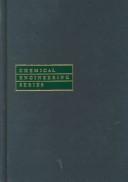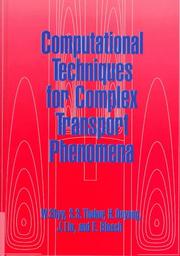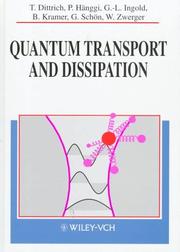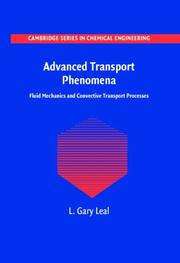| Listing 1 - 10 of 13 | << page >> |
Sort by
|
Book
ISBN: 0070198918 Year: 1983 Publisher: New York : McGraw-Hill,
Abstract | Keywords | Export | Availability | Bookmark
 Loading...
Loading...Choose an application
- Reference Manager
- EndNote
- RefWorks (Direct export to RefWorks)
Transport theory. --- Chemical engineering. --- Théorie du transport. --- Génie chimique.
Book
ISBN: 9781138114296 9781420067569 9781420067576 Year: 2017 Publisher: Boca Raton, FL : CRC Press,
Abstract | Keywords | Export | Availability | Bookmark
 Loading...
Loading...Choose an application
- Reference Manager
- EndNote
- RefWorks (Direct export to RefWorks)
Although computer technology has dramatically improved the analysis of complex transport phenomena, the methodology has yet to be effectively integrated into engineering curricula. The huge volume of literature associated with the wide variety of transport processes cannot be appreciated or mastered without using innovative tools to allow comprehension and study of these processes. Connecting basic principles with numerical methodology for solving the conservations laws, Computational Transport Phenomena for Engineering Analyses presents the topic in terms of modern engineering analysis. The book includes a production quality computer source code for expediting and illustrating analyses of mass, momentum, and energy transport.The text covers transport phenomena with examples that extend from basic empirical analyses to complete numerical analyses. It includes a computational transport phenomena (CTP) code written in Fortran and developed and owned by the authors. The code does not require a lease and can run on a PC or a supercomputer. The authors also supply the source code, allowing users to modify the code to serve their particular needs, once they are familiar with the code. Using the CTP code, grid generation and solution procedures are described and visual solution presentations are illustrated thus offering extensive coverage of the methodology for a wide range of applications.The authors illustrate and emphasize that the very general solutions afforded by solving the unsteady, multidimensional transport equations for real multicomponent fluids describe an immense body of physical processes. Bringing together a wealth of professional and instructional experience, this book stresses a problem-solving approach that uses one set of computational and graphical tools to describe all aspects of the analysis. It provides understanding of the principles involved so that code improvements and/or use of commercial codes can be accomplished knowledgeably.
Computational fluid dynamics. --- Transport theory --- Modélisation CFD. --- Théorie du transport --- Mathematics. --- Mathématiques.

ISBN: 0070079633 Year: 1988 Publisher: New York (N.Y.): MacGraw-Hill
Abstract | Keywords | Export | Availability | Bookmark
 Loading...
Loading...Choose an application
- Reference Manager
- EndNote
- RefWorks (Direct export to RefWorks)
Transport theory --- Boltzmann transport equation --- Transport phenomena --- Mathematical physics --- Particles (Nuclear physics) --- Radiation --- Statistical mechanics --- Transport theory. --- Transport, Théorie du. --- Théorie du transport. --- Théorie du transport.
Book
Year: 1958 Publisher: New York : Interscience Publishers, Inc.,
Abstract | Keywords | Export | Availability | Bookmark
 Loading...
Loading...Choose an application
- Reference Manager
- EndNote
- RefWorks (Direct export to RefWorks)
Statistical mechanics --- Transport theory --- Irreversible processes --- Théorie du transport. --- Mécanique statistique. --- Processus irréversibles. --- Congresses --- Théorie du transport. --- Mécanique statistique. --- Processus irréversibles.
Book
ISBN: 9781107016651 1107016657 Year: 2018 Publisher: New York: : Cambridge University Press,
Abstract | Keywords | Export | Availability | Bookmark
 Loading...
Loading...Choose an application
- Reference Manager
- EndNote
- RefWorks (Direct export to RefWorks)
"The Physics of Energy provides a comprehensive and systematic introduction to the scientific principles governing energy sources, uses, and systems. This definitive textbook traces the flow of energy from sources such as solar power, nuclear power, wind power, water power, and fossil fuels through its transformation in devices such as heat engines and electrical generators, to its uses including transportation, heating, cooling, and other applications. The flow of energy through the Earth's atmosphere and oceans, and systems issues including storage, electric grids, and efficiency and conservation are presented in a scientific context along with topics such as radiation from nuclear power and climate change from the use of fossil fuels. Students, scientists, engineers, energy industry professionals, and concerned citizens with some mathematical and scientific background who wish to understand energy systems and issues quantitatively will find this textbook of great interest. Robert L. Jaffe holds the Morningstar Chair in the Department of Physics at MIT. He was formerly director of MIT's Center for Theoretical Physics and recently chaired the American Physical Society's Panel on Public Affairs. Jaffe is best known for his research on the quark substructure of the proton and other strongly interacting particles, on exotic states of matter, and on the quantum structure of the vacuum. He received his BA from Princeton and his PhD from Stanford. In recognition of his contributions to teaching and course development at MIT, Jaffe has received numerous awards including a prestigious MacVicar Fellowship"-- Provided by publisher
Natural resources. --- Power resources. --- Thermodynamics. --- Nuclear physics. --- Transport theory. --- Ressources énergétiques. --- Ressources naturelles. --- Thermodynamique. --- Transport, Théorie du. --- Thermodynamique --- Power resources --- Physics --- Renewable energy sources --- Théorie du transport. --- Ressources énergétiques. --- Théorie du transport.
Book
ISBN: 9780199592449 9780199673490 Year: 2013 Publisher: Oxford, United Kingdom : Oxford University Press,
Abstract | Keywords | Export | Availability | Bookmark
 Loading...
Loading...Choose an application
- Reference Manager
- EndNote
- RefWorks (Direct export to RefWorks)
Advances in nanotechnology have allowed physicists and engineers to miniaturize electronic structures to the limit where finite-size related phenomena start to impact their properties. This book discusses such phenomena and models made for their description. The book starts from the semiclassical description of nonequilibrium effects, details the scattering theory used for quantum transport calculations, and explains the main interference effects. It also describes how to treat fluctuations and correlations, how interactions affect transport through small islands, and how superconductivity modifies these effects. The last two chapters describe new emerging fields related with graphene and nanoelectromechanics. The focus of the book is on the phenomena rather than formalism, but the book still explains in detail the main models constructed for these phenomena. It also introduces a number of electronic devices, including the single-electron transistor, the superconducting tunnel junction refrigerator, and the superconducting quantum bit.--
Nanoelectronics --- Transport theory --- Fluctuations (Physics) --- Low temperatures --- Low temperatures. --- Nanoelectronics. --- Transport theory. --- Nanoélectronique --- Transport, Théorie du --- Fluctuations (physique) --- Basses températures --- Fluctuations (Physics). --- Théorie du transport --- Nanoélectronique --- Théorie du transport --- Basses températures
Book
Year: 1965 Publisher: Oxford ; London ; Edinburgh : Pergamon Press
Abstract | Keywords | Export | Availability | Bookmark
 Loading...
Loading...Choose an application
- Reference Manager
- EndNote
- RefWorks (Direct export to RefWorks)
Transport theory. --- Diffusion. --- Calculus of variations. --- Perturbation (Mathematics) --- Théorie du transport. --- Diffusion (physique nucléaire) --- Calcul des variations. --- Perturbation (mathématiques) --- Théorie du transport. --- Diffusion (physique nucléaire) --- Perturbation (mathématiques)

ISBN: 0521592682 Year: 1997 Publisher: Cambridge Cambridge University press
Abstract | Keywords | Export | Availability | Bookmark
 Loading...
Loading...Choose an application
- Reference Manager
- EndNote
- RefWorks (Direct export to RefWorks)
Computational fluid dynamics. --- Multiphase flow --- Turbulence --- Transport theory --- Mathematical models. --- Fluid dynamics --- #KVIV:BB --- CFD (Computational fluid dynamics) --- Data processing --- Mathematical models --- Computer simulation --- Data processing. --- Mathematical mocels. --- Dynamique des fluides --- Écoulement polyphasique --- Théorie du transport --- Traitement des données --- Modèles mathématiques --- Écoulement polyphasique --- Théorie du transport --- Traitement des données --- Modèles mathématiques

ISBN: 3527292616 Year: 1998 Publisher: Weinheim Wiley-VCH
Abstract | Keywords | Export | Availability | Bookmark
 Loading...
Loading...Choose an application
- Reference Manager
- EndNote
- RefWorks (Direct export to RefWorks)
Quantum mechanics. Quantumfield theory --- Quantum theory. --- Transport theory. --- Energy dissipation. --- Théorie quantique --- Transport, Théorie du --- Dissipation d'énergie --- Energy dissipation --- Quantum theory --- Transport theory --- Boltzmann transport equation --- Transport phenomena --- Mathematical physics --- Particles (Nuclear physics) --- Radiation --- Statistical mechanics --- Quantum dynamics --- Quantum mechanics --- Quantum physics --- Physics --- Mechanics --- Thermodynamics --- Degradation, Energy --- Dissipation (Physics) --- Energy degradation --- Energy losses --- Losses, Energy --- Force and energy --- Théorie quantique --- Transport, Théorie du --- Dissipation d'énergie --- Diffusion. --- Théorie quantique. --- Transport, Théorie du. --- Dissipation d'énergie. --- Diffusion --- Théorie du transport. --- Théorie quantique. --- Théorie du transport. --- Dissipation d'énergie.

ISBN: 9780521849104 0521849101 9780521179089 9780511800245 9780511296475 0511296479 0511295707 9780511295706 9780511294136 0511294131 0521179084 051180024X 9786610959624 6610959625 110716480X 051129493X 1280959622 0511567960 Year: 2007 Publisher: Cambridge New York Cambridge University Press
Abstract | Keywords | Export | Availability | Bookmark
 Loading...
Loading...Choose an application
- Reference Manager
- EndNote
- RefWorks (Direct export to RefWorks)
Advanced Transport Phenomena is ideal as a graduate textbook. It contains a detailed discussion of modern analytic methods for the solution of fluid mechanics and heat and mass transfer problems, focusing on approximations based on scaling and asymptotic methods, beginning with the derivation of basic equations and boundary conditions and concluding with linear stability theory. Also covered are unidirectional flows, lubrication and thin-film theory, creeping flows, boundary layer theory, and convective heat and mass transport at high and low Reynolds numbers. The emphasis is on basic physics, scaling and nondimensionalization, and approximations that can be used to obtain solutions that are due either to geometric simplifications, or large or small values of dimensionless parameters. The author emphasizes setting up problems and extracting as much information as possible short of obtaining detailed solutions of differential equations. The book also focuses on the solutions of representative problems. This reflects the book's goal of teaching readers to think about the solution of transport problems.
Fluid mechanics --- Transport theory --- Continuum mechanics --- 532 --- 66.021.2 --- Mechanics of continua --- Elasticity --- Mechanics, Analytic --- Field theory (Physics) --- Boltzmann transport equation --- Transport phenomena --- Mathematical physics --- Particles (Nuclear physics) --- Radiation --- Statistical mechanics --- Hydromechanics --- Fluid mechanics in general. Mechanics of liquids (hydromechanics) --- Momentum transfer. Fluid flow and mixing --- 66.021.2 Momentum transfer. Fluid flow and mixing --- 532 Fluid mechanics in general. Mechanics of liquids (hydromechanics) --- Fluides, Mécanique des --- Transport, Théorie du --- Milieux continus, Mécanique des --- Mécanique des fluides --- Théorie du transport --- Mécanique des fluides --- Théorie du transport --- Milieux continus, Mécanique des
| Listing 1 - 10 of 13 | << page >> |
Sort by
|

 Search
Search Feedback
Feedback About UniCat
About UniCat  Help
Help News
News